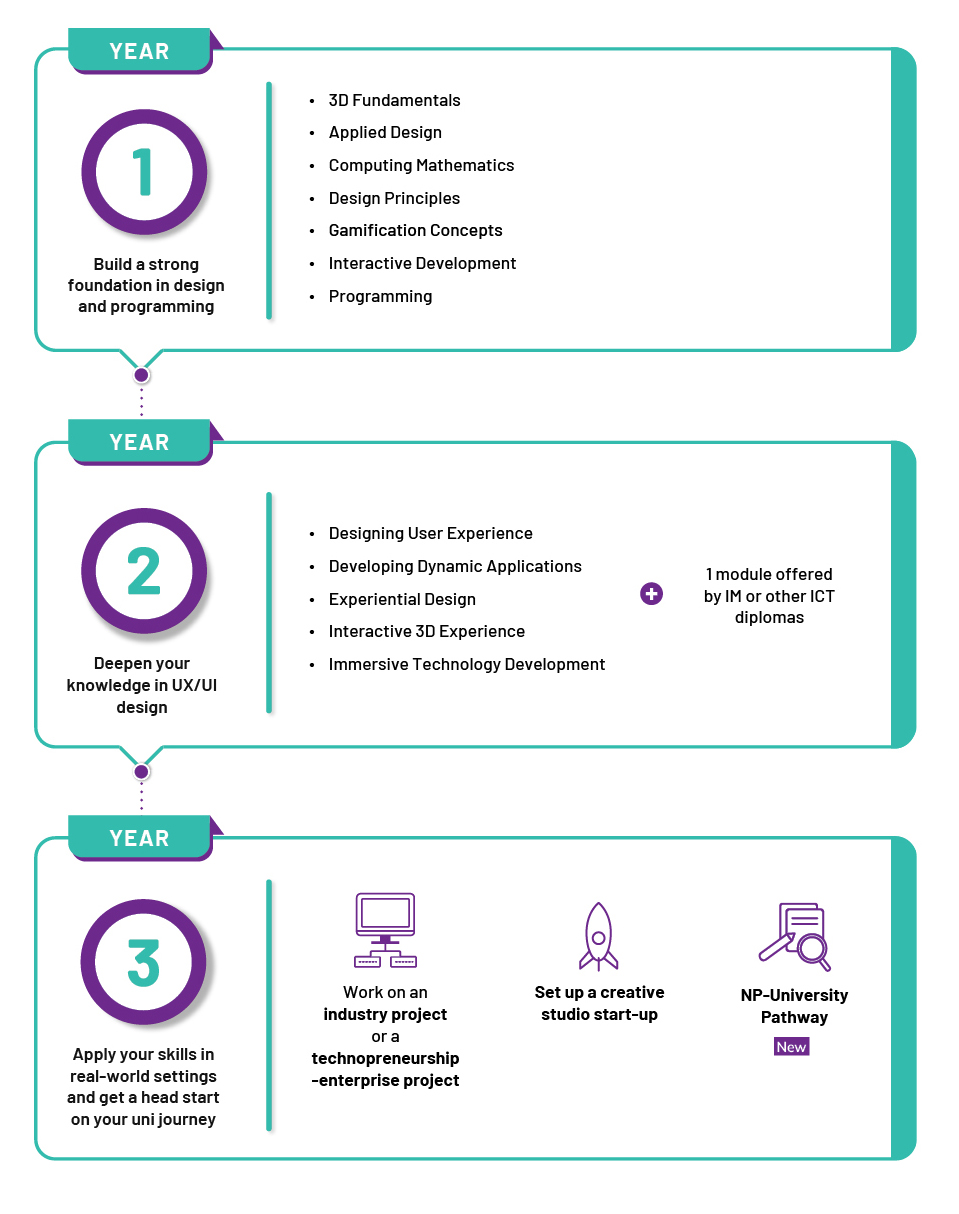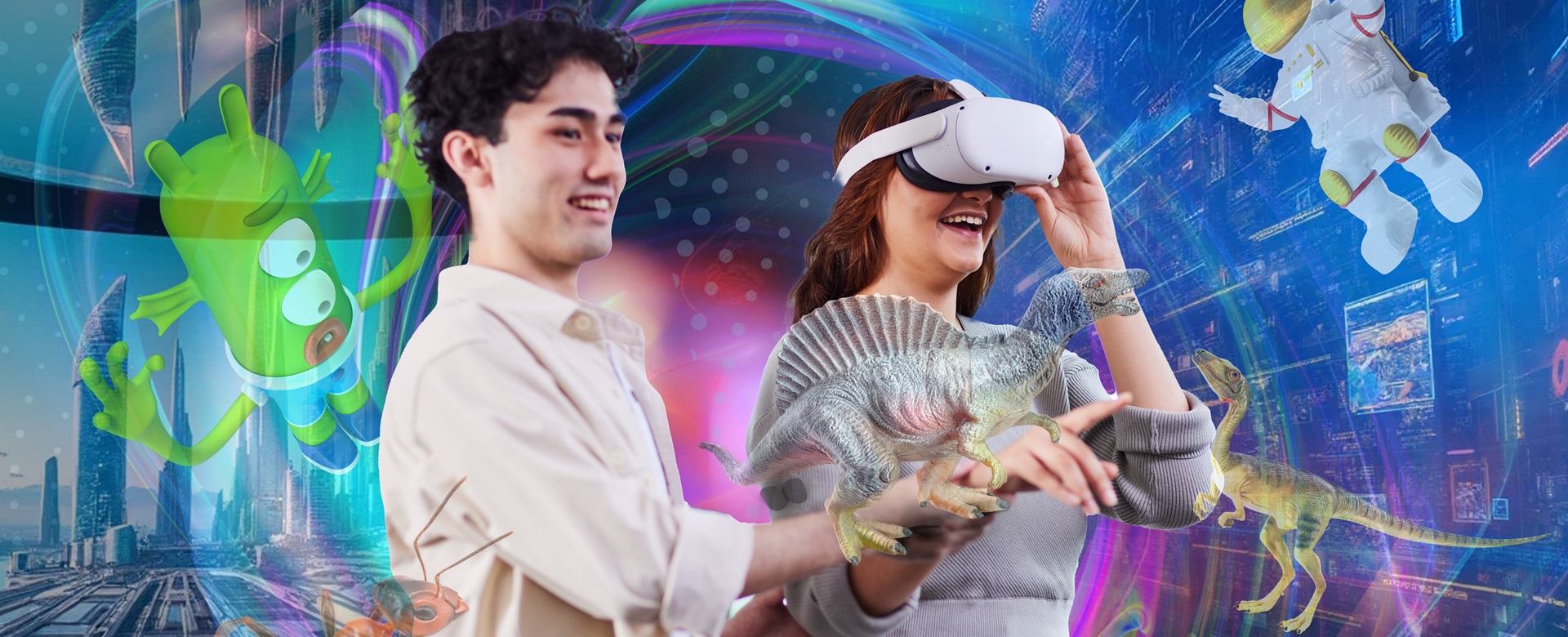Why IM?
- Design immersive experiences and games that feature augmented, virtual and mixed realities (AR/VR/MR)
- Build your portfolio through integrated projects that hone your skills
- Opportunities to work on capstone projects and go on internships at renowned organisations such as HelloHolo, UbiSoft, White Label Studio, The Doodle People, En Group and UXArmy
- Gain insights into the IT and creative media industries with masterclasses, industry visits, networking sessions and collaborations
- Kickstart your degree with the NP-University Pathway and gain advanced placement in undergraduate programmesNEW
About IM
As digital technology increasingly permeates every aspect of our lives, there is growing demand for creative professionals who can design immersive experiences that engage audiences.
If you are passionate about interactive media, simulations, or game development, the Diploma in Immersive Media (IM) will equip you with the skills for these dynamic sectors. Here, you will explore Augmented, Virtual, and Mixed Realities (AR/VR/ MR), and create digital products ranging from web applications to extended reality platforms.
With training in user experience (UX) and user interface (UI) design, as well as the real-time environment design workflow, IM will get you ready for careers in the creative and tech industries. These include roles such as UX/UI designer, app or web developer, technical/3D artist, and immersive media designer.
Learn through hands-on projects – and say goodbye
to exams! Our signature Project-Based Learning
allows you to build your portfolio by working on an
Integrated Project every semester.
Round up a team to set up your own studio to develop
games, design interactive 3D experiences or create
media content. You could even design your very own
metaverse! By the end of your studies, you will have a
stellar portfolio that will give you a career head start
Hear from industry insiders and gain valuable insights
through masterclasses, industry visits, networking
sessions, and collaborations. Embark on internships
and contribute to real-world projects at companies
like HelloHolo, The Doodle People, White Label Studio,
Ubisoft, and UXArmy. Gain a competitive edge in your
career by earning professional certifications from
industry leaders like Unity Technologies and Adobe!
Fast-track your university journey with our NP-SMU
Pathway! This pathway allows you to take university
modules during your diploma studies, and gain
advanced placement in their Information Systems and
Computing Science programmes.
Overview of Your IM Journey

Further Studies
You may receive advanced standing when you apply for related degree programmes at universities both locally and abroad. These include:
Singapore
- DigiPen Institute of Technology
- Nanyang Technological University
- National University of Singapore
- Singapore Institute of Technology
- Singapore University of Social Sciences
- Singapore University of Technology and Design
Australia
- Queensland University of Technology
- RMIT University
United Kingdom
- The Glasgow School of Art
- University of Hertfordshire
United States
- Savannah College of Art and Design
- University of Southern California
Careers
With our course skills mapped to the ICT Skills Framework, you can look forward to pursuing a career in these job roles:
- 3D Artist
- Creative Technologist
- Digital Content Creator
- Extended Reality (AR/VR/MR) Designer/Developer
- Front-End Designer
- Game Developer/Designer
- Game Interface Designer
- Junior Designer
- Junior Programmer
- Level Designer
- Multimedia Designer
- Producer
- UI/UX Designer
- Visual Designer
- Web Designer
Entry Requirements
AGGREGATE TYPE ELR2B2-C
To be eligible for consideration, candidates must have the following GCE ‘O’ Level examination (or equivalent) results.
| Subject | 'O' Level Grade |
|---|---|
| English Language | 1-7 |
| Additional Mathematics/Mathematics | 1-6 |
| Any one of the 2nd group of Relevant Subjects for the ELR2B2-C Aggregate Type | 1-6 |
Applicants must also fulfil the aggregate computation requirements for the ELR2B2-C Aggregate Type ( English Language, 2 relevant subjects and 2 other best subjects) listed at www.np.edu.sg/docs/ELR2B2.pdf.
For students with other qualifications, please refer to the NP website for the entry requirements and admissions exercise period.
Candidates with colour vision deficiency, severe vision deficiency or hearing deficiency may encounter difficulties meeting the course requirements and expectations. Those with mild colour vision deficiency are required to undergo an in-house test.
Students are required to own a MacBook or Windows notebook and purchase art materials.
What You Will Learn
Computing Mathematics (4 Credit Units)
This module introduces the basic concepts of relations and functions, matrices, statistical methods and relevant applications. The main emphasis is to develop students’ ability in solving quantitative problems in computing mathematics, probability and statistic.
Cyber Security Fundamentals (2 Credit Units)
This module provides an overview of the various domains of cyber security. It helps to develop an understanding of the importance of cyber security in today’s digital world. It aims to provide an appreciation of cyber security from an end-to-end perspective. It covers fundamental security concepts, tools and techniques in domains such as data, end-user, software, system, network, physical, organization, and digital forensics. It also helps to develop knowledge and skills in identifying common cyber threats and vulnerabilities, and to apply techniques to tackle these issues.
Design Principles (2 Credit Units)
This module introduces students to basic elements and principles of design. Students will practice visual communication and self-branding through aesthetic use of line, shape, form, color, texture, typography, scale, contrast, rhythm and balance. Students will be trained in the usage of digital design tools and application of modern industrial practices to communicate the concepts, designs and solutions.
Data Science Fundamentals (2 Credit Units)
This module provides an overview of Data Science, its importance in the world of data and how it affects the competitiveness of organizations. Learners will learn about the different areas within Data Science and the core pillars essential to practise in the area. Students will also be introduced to Design Thinking. Indicative topics include Introduction to Data Science, Big Data and Analytical Design Thinking.
Fundamentals for IT Professionals 1 (2 Credit Units)
This module provides a broad introduction to the field of ICT by exploring the roles, professional practice, ethical expectations and career development paths of IT professionals. Through a guided inculcation of interpersonal and teamwork skills with strong team bonding spirit, the module aims to deepen students’ commitment to the sector that the course prepares them for. In addition, students will be required to begin charting their career path in the ICT industry by considering crucial aspects such as personal preferences and aptitude, job roles and responsibilities, skills needed and further education.
Programming 1 (5 Credit Units)
This module introduces the fundamentals of programming and how to develop programs using appropriate problem-solving techniques in a modular style. In this practice-oriented module, students are taught how to apply problem-solving skills using a top-down structured programming methodology and given ample practice in translating solutions into computer programs, then test and debug the programs. Topics include data types, variables, expressions, statements, selection structures, loops, simple computation and algorithms, and the use of libraries. Students will also practise the use of pseudocodes, best practices of programming, debugging techniques with the help of tools, development of test cases, and suitable program documentation. In addition, they will study various areas where application software plays a prominent part in helping organisations solve problems. Student will be given ample opportunity for independent and self-directed learning.
English Language Express* (Credit Units - NA)
English Language Express aims to give you a better grounding in the English Language and to strengthen the written and oral communications skills that you will need in your academic and professional careers. You will be engaged in writing, reading, listening and speaking activities that will develop your ability to speak and write grammatically, coherently and clearly. You will also hone your reading and listening comprehension skills.
Health & Wellness^ (1 Credit Unit)
This is a Level 1 Core module for all Year 1 students. The module will introduce students to the importance of maintaining both physical and mental health through the knowledge and monitoring of health indicators, and application through appropriate exercises. The aim of the module is to empower students with basic knowledge and skills to be independent and responsible in maintaining overall personal health.
Innovation Made Possible^ (3 Credit Units)
^ Critical Core modules account for 10 credit units of the diploma curriculum. They include modules in innovation and world issues, as well as an interdisciplinary project. By bringing students from diverse diplomas together, the interdisciplinary project fosters collaboration to explore and propose solutions for real-world problems. NP aims to develop students to be agile and self-directed learners, ready for the future workplace.
3D Fundamentals (4 Credit Units)
This module introduces students to basic digital 3D production workflow to create assets for interactive projects. Students will practice basic modelling, UV unwrapping, digital sculpting, high-poly detail onto low-poly mapping, texturing, rigging, animation, real-time lighting and rendering. Students will learn to produce hard-surface virtual objects for real-time engine.
Applied Design (4 Credit Units)
This module introduces students to design application through digital props and environment concept illustration. Students will practice perspective drawing, constructive drawing, color rendering, and compositional design. Students will learn to produce visual plans essential in real-time immersive production workflow.
Interactive Development (4 Credit Units)
This module widens students’ programming knowledge by covering programming concepts through the creation of interactive media applications. Students refine their knowledge of programming by decomposing their programs into classes and objects. Students learn to understand, design and build modern interfaces, moving on to create interactive elements. The focus of this module is to incorporate interaction design and methodology to build interactive applications around it.
Gamification Concepts (4 Credit Units)
This module studies the game mechanics – the rules intended to produce an enjoyable gameplay and introduces the principles and methodologies behind the rules and play of games. Once students have mastered the basics of game- design elements and game principles, they will learn to apply them in nongame contexts to improve user engagement, organizational productivity and learning.
Production Management (2 Credit Units)
This module introduces the interactive digital media and game industry, the production pipeline, and various professional roles and career paths, and exposes students to various document required in the production of interactive experience & games. It examines the roles of different participants in the development process and how the technical development and the artistic development proceed in tandem.
Confident Communication: Find Your Voice (VOICE)^ (3 Credit Units)
^ Critical Core modules account for 10 credit units of the diploma curriculum. They include modules in innovation and world issues, as well as an interdisciplinary project. By bringing students from diverse diplomas together, the interdisciplinary project fosters collaboration to explore and propose solutions for real-world problems. NP aims to develop students to be agile and self-directed learners, ready for the future workplace.
3D for Real-time (4 Credit Units)
This module introduces students to basic real-time environment design workflow. Students will practice modular hard- surface modelling integrating real-time engine graphics optimization techniques with focus on interior spatial layout design & lighting for immersive media.
Designing User Experience (4 Credit Units)
This module aims to equip students with skills and techniques to fulfil the various stages of the UX design process, leading to optimum user-centric digital products. Exposure to various problem statements will aid students in developing critical, analytical perspectives for framing their approaches in problem-solving. Other major topics includes: Research methods, Inclusive Design, Interaction Design, Rapid Prototyping, Measuring User Experience and Usability Testing. Students are also guided on how to compile a proper UX portfolio.
Fundamentals for IT Professionals 2 (2 Credit Units)
This module gives a course-based experience in which students can engage with the local community and industry. This includes participation in community service events or in Service-Learning projects that leverage students’ discipline knowledge and skills to meet identified needs. Through iterative and guided reflection on the service experience, students gain a broader appreciation of their discipline and an enhanced sense of personal voice, empathy and civic responsibility. Industry talks and seminars are organised to keep students up to-date with emerging trends and develop their interpersonal, team and networking skills with the community and industry.
Interactive 3D Experience (4 Credit Units)
This module continues to develop students’ ability to design and author highly interactive experience applications. The programming focuses on interactivity authoring through the eyes of designers for animation, visual effects, multimedia and games. It covers advanced authoring, digital storytelling techniques, user experience design, and project management techniques. Additionally, students will utilise a real-time engine and create prototypes for interactive immersive projects.
Spatial Theory & Level Design (4 Credit Units)
This module introduces the fundamental spatial concepts and how to leverage on it to create spaces and flow for an immersive experience. It covers the design of environments and levels from the start at a conceptual beginning and arrives at a polished end to build multiple levels and engaging flow for the users in an immersive simulated environment for training and simulation.
World Issues: A Singapore Perspective^ (2 Credit Units)
^ Critical Core modules account for 10 credit units of the diploma curriculum. They include modules in innovation and world issues, as well as an interdisciplinary project. By bringing students from diverse diplomas together, the interdisciplinary project fosters collaboration to explore and propose solutions for real-world problems. NP aims to develop students to be agile and self-directed learners, ready for the future workplace.
3D Environments (4 Credit Units)
This module introduces students to advanced real-time environment design workflow. Students will practice modular organic 3D asset production workflow integrating basic real-time tech art, effects, lighting, and post processing with focus on exterior spatial layout design for immersive media.
Developing Dynamic Applications (4 Credit Units)
This module aims to broaden students’ skillsets by introducing server-side development to create a digital product. It covers various client-server architectural concepts that involve rich client, application server and database. Students will hone their programming skills by learning server-side programming, object-oriented programming, database design and development. In addition, students will experience the development production process and workflow.
Experiential Design (4 Credit Units)
This module exposes and introduce students to designing media content and applications for various platforms. It covers the concept of designing extended reality (XR) products with heavy emphasis on the User Experience (UX) for the respective platforms. Students will be tested on their observational, research and problem-solving skills to seek out current/future technological advancements, and to come up with proposals and prototypes for actual implementation.
Immersive Technology Development (4 Credit Units)
This module provides an overview of emerging technologies with emphasis in interactive and immersive technologies, and the impact they have on the users. It is designed to help students keep abreast of the latest immersive experiences or technology developments to stay current and relevant in the fast-moving industry. To achieve this objective, the syllabus for this module will be guided by technology research and feedback from industry partners, and both seminar- style and hands-on workshop teaching approaches may be adopted depending on the nature of the topic covered.
Elective 1 (4 Credit Units)
See Year 3 for elective modules.
Capstone Project (8 Credit Units)
In this module, students are required to complete a substantial project that is the culmination of their education in the School of InfoComm Technology. The project can be a real-world problem proposed by a client, or it can be proposed by the student in pursuit of their personal interests.
Fundamentals of IT Professionals 3 (2 Credit Units)
This module provides a stepping-stone for students in their IT career. They are equipped with skills necessary to seek and secure work. They will also sharpen their communication skills and learn to market themselves effectively. Students will gain insights into the infocomm industry and keep abreast the latest skill sets required in their IT career path. They will also have opportunity to be exposed to various institutes of higher learning to further acquire their skill sets.
Project ID: Connecting the Dots^ (4 Credit Units)
^ Critical Core modules account for 10 credit units of the diploma curriculum. They include modules in innovation and world issues, as well as an interdisciplinary project. By bringing students from diverse diplomas together, the interdisciplinary project fosters collaboration to explore and propose solutions for real-world problems. NP aims to develop students to be agile and self-directed learners, ready for the future workplace.
Elective 2 (4 Credit Units)
ELECTIVE MODULES
Students will be able to choose from a basket of electives offered or take electives offered by other Diplomas.
3D Character Creation
This module introduces students to character creation for real-time media workflow. Students will practice character digital sculpting, low-poly retopology, texturing, auto-rigging, and mo-cap animation re-mapping for interactive character integration for immersive media.
Digital Audio Design
This module introduces the production techniques of audio and sound effect, ambient sounds, background music and dialogue to enhance the user experience and/or to advance a story and create mood, place, and emphasis. It covers its associated technologies, the equipment used, the procedures and explores the manipulations of various envelopes on amplitude, filter and modulation and the use of low frequency oscillator and noise in designing sound. It also covers subtractive synthesising and studies the processing and reactions of sounds in an interactive environment.
Digital Video & Audio
This module introduces basic digital shorts production. Students will first learn audio-video production theory followed by practical production in labs and on location in the field. Production know-how, processes, cameras, microphone systems, audio-video editing software, and lights will be provided. In-class practical audio, camera and editing exercises followed by continuous assessments, two assignments and a test are all designed to reinforce student learning.
Motion Graphics & Effects
This module inducts students into the world of digital effects. Aimed at value-adding to the storytelling experience, students are first introduced to the impact of visual effects on storytelling in films, followed by the principles and element of motion design. Exercises, assessments and assignments are aimed at developing research, conceptualization and storytelling skills for the creation of compelling and exciting time-based media.
Procedural Modelling & Simulation
This module introduces the concepts of procedural modelling. Students will learn to create models and environments from a set of rules using industry standards software and use the procedural generated content in immersive projects and simulations.
Serious Games & Simulations
This module focuses on designing games that aim to change human’s behaviours, knowledge, and attitudes as well as the way people work, and businesses compete in diverse areas including education, training, marketing and advertising. It examines the process of creating an engaging learning situation and making learning fun and entertaining through game-based thinking and game mechanics, from the perspectives of pedagogies and persuasive aspects.
Social Media & Branding
This module introduces students to creative sections in advertorial, communications and media. Students broaden their knowledge in designing for various aspects of visual communications. Students apply creative thinking skills and expand their creative mindsets through questioning and reasoning data.
3D Prototyping
This module introduces the aspects of rapid prototyping by allowing students to partake in designing 3D models and implementing them into a physical 3D product. Students are exposed to various prototyping methods and covers product design and using 3D printing as an enabling technology.
Internship/Project
This module provides students with the opportunity to apply the knowledge and skills gained from the various modules in the course to the development of an IT solution to solve a practical problem. Students may undertake an in-house industry-driven project or a real-life IT project in an organisation that may include problem definition, requirements analysis, design, development and testing, delivery and presentation of the solution.
Through the project, students will learn to appreciate the project planning and control issues relating to IT project development.





